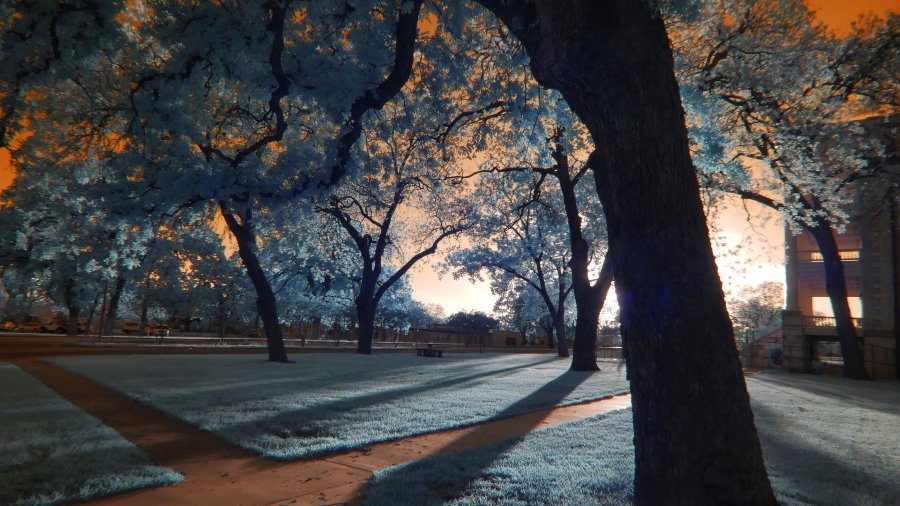THE NAMES OF TREES
Winner: LOIS WEBER PIONEER AWARD
Crew: Producers: Pamela Falkenberg – Screenwriters: Lucy English
Email: outliermovingpictures@gmail.com
Synopsis
Images of decay and regeneration photographed using a video camera whose sensor has been modified for infrared photography create a post apocalyptic, strangely alluring, but disconnected world. A mesmerizing series of largely deserted rural and urban landscapes concretizes the bittersweet memories of a lost love in Pamela Falkenberg and Jack Cochran’s film of Lucy English’s poem, “The Names of Trees,” part of her Book of Hours film project, whose collected poems have now been published in book form. Accepted by more than thirty festivals in fifteen different countries, and nominated for best visual poem and best experimental film several times, including by the BAFTA qualifying Wales International Film Festival, Outlier’s most widely celebrated film is surprisingly uplifting, hauntingly beautiful, and deeply mysterious.
Director
Pamela Falkenberg and Jack Cochran met in graduate school and made films together when they were young. Jack went on to become a professional cinematographer working out of LA and London, while Pam stayed in the Midwest, where she was a college professor and independent filmmaker before dropping out to work in visual display. Their first film together, “The Cost of Living,” based on some of Jack’s short poems, screened at several film festivals, including the Buffalo International Film Festival and the Cornwall Film Festival, was nominated for two awards at the 2019 Queens World Festival, and took the award for best experimental film at the 2016 WV FILMmakers Festival. Other short poetry films have screened at the Ò Bhéal Poetry Film Festival (2016, 2018, 2019), the Juteback Poetry Film Festival (2017, 2018), the Festival Silencio (2017), the Filmpoem Festival (2017), the 6th CYCLOP Videopoetry Festival (2017), and the 6th, 7th, and 8th International Video Poetry Festival (Athens Greece). Their most ambitious film, “Teddy Roosevelt and Fracking,” about environmental threats to the wild landscapes of North Dakota, premiered at the 2018 Queens World Film Festival, where it was nominated for three awards and took the award for Best Documentary Short, followed by awards at the Go West Film Festival, the Ozark Foothills Film Festival, and the American Presidents Film and Literary Festival at the Rutherford B. Hayes Presidential Library and Museum. Their most recent poetry films, “In West Virginia,” and “Flag Country,” based on poems by Dave Bonta, have already screened at the Buffalo International Film Festival, the Small Axe Radical Film Festival, the Newlyn Film Festival, and the North Dakota Human Rights Arts Festival. Pam and Jack are currently working a new untitled triptych with Lucy English on climate change; “Now and Then,” an experimental film based on a new collection of Jack’s poems; and their first feature together, an experimental documentary essay about the loneliest road in America.
Filmmaker’s Note
For the past five years, Jack Cochran and Pamela Falkenberg have been making personal films together again under the name Outlier Moving Pictures. They hope their work will prove worthy of the name: avoiding the usual patterns and approaching their subject matter from the margins (which sounds better than saying that as filmmakers they’re oddballs and cranks). Jack and Pam co-direct the films they make together, and they collaborate fully, even when they divide up the credits. Their poetry films usually start with a poem (often, but not always, one of Jack’s poems), which they think of as analogous to a script. However, when collaborating with Lucy English on “The Shadow” and “The Names of Trees,” the process was more dialectical: some images and sounds came first, then Lucy wrote the poems; the poems inspired more images, and eventually the edited film poems. For us, the exact process depends on the project and remains open to experiment, so our body of work is somewhat disparate and hard to categorize. Some of our eclectic interests include collage, found footage, and repurposing; the film essay and film poetry; image capturing and post-production techniques that reveal what cannot be seen with the eyes alone (e.g., high shutter speeds, moving cameras, infrared photography, green screen and digital layering); landscapes and the ways humans mark them; human rights/social justice; and postmodern melodrama. Jack has written poetry all his life, but he never knew what to do with it until he shared his notebooks with Pam, who said, “You’re a filmmaker — shouldn’t your poems be films?” Pam and Jack both want to make lots of different kinds of films together, but Pam is especially proud to have been the one who suggested that Jack’s poems should come to life as films. They are both delighted that making films of Jack’s poems has led to interesting collaborations with other poets and filmmakers.


